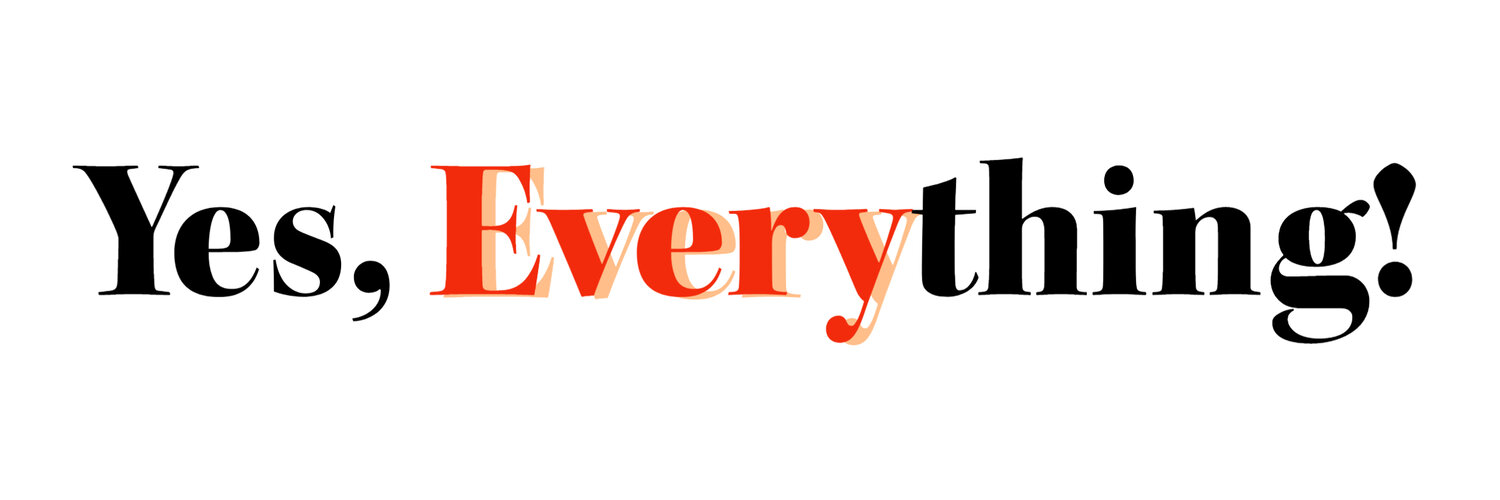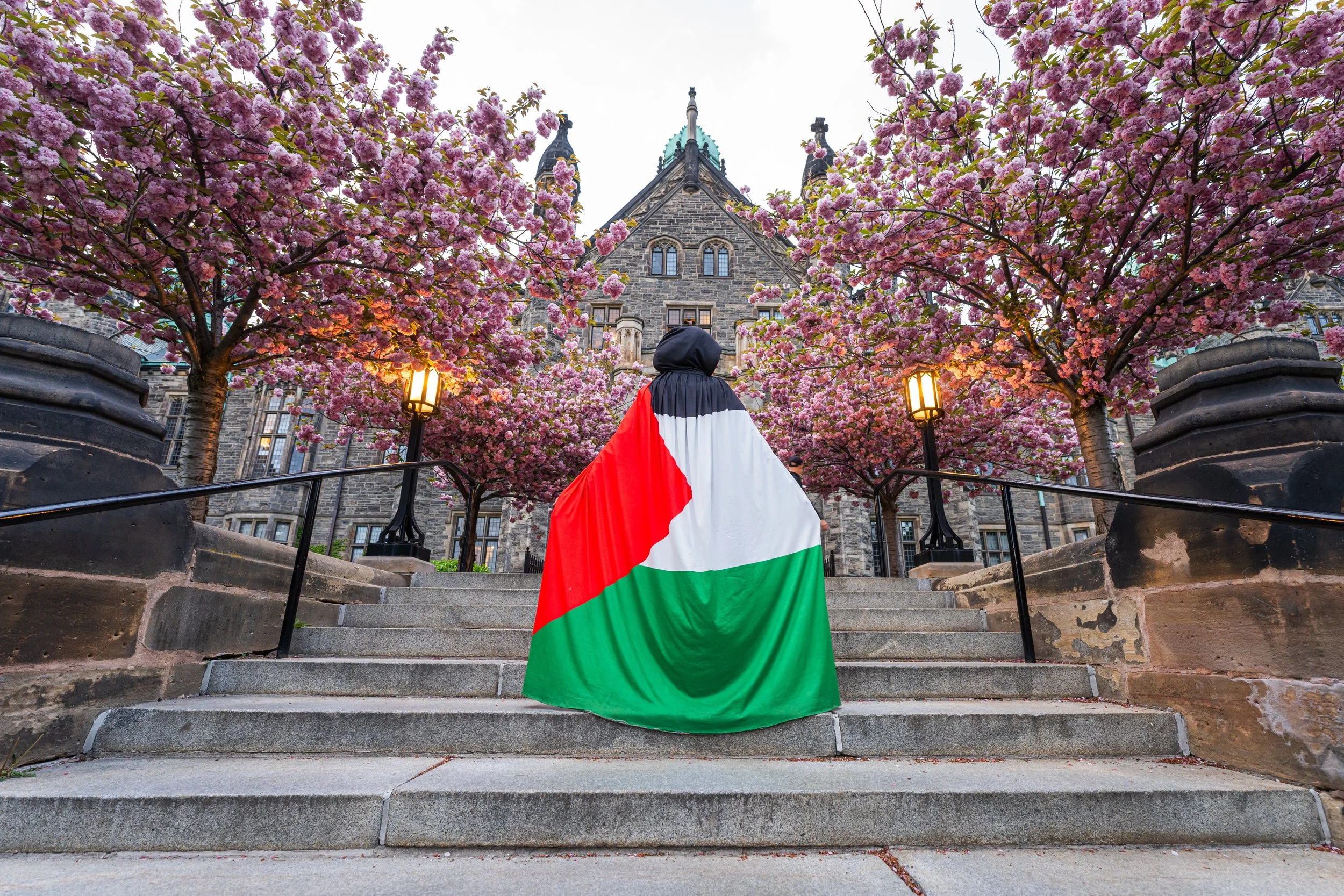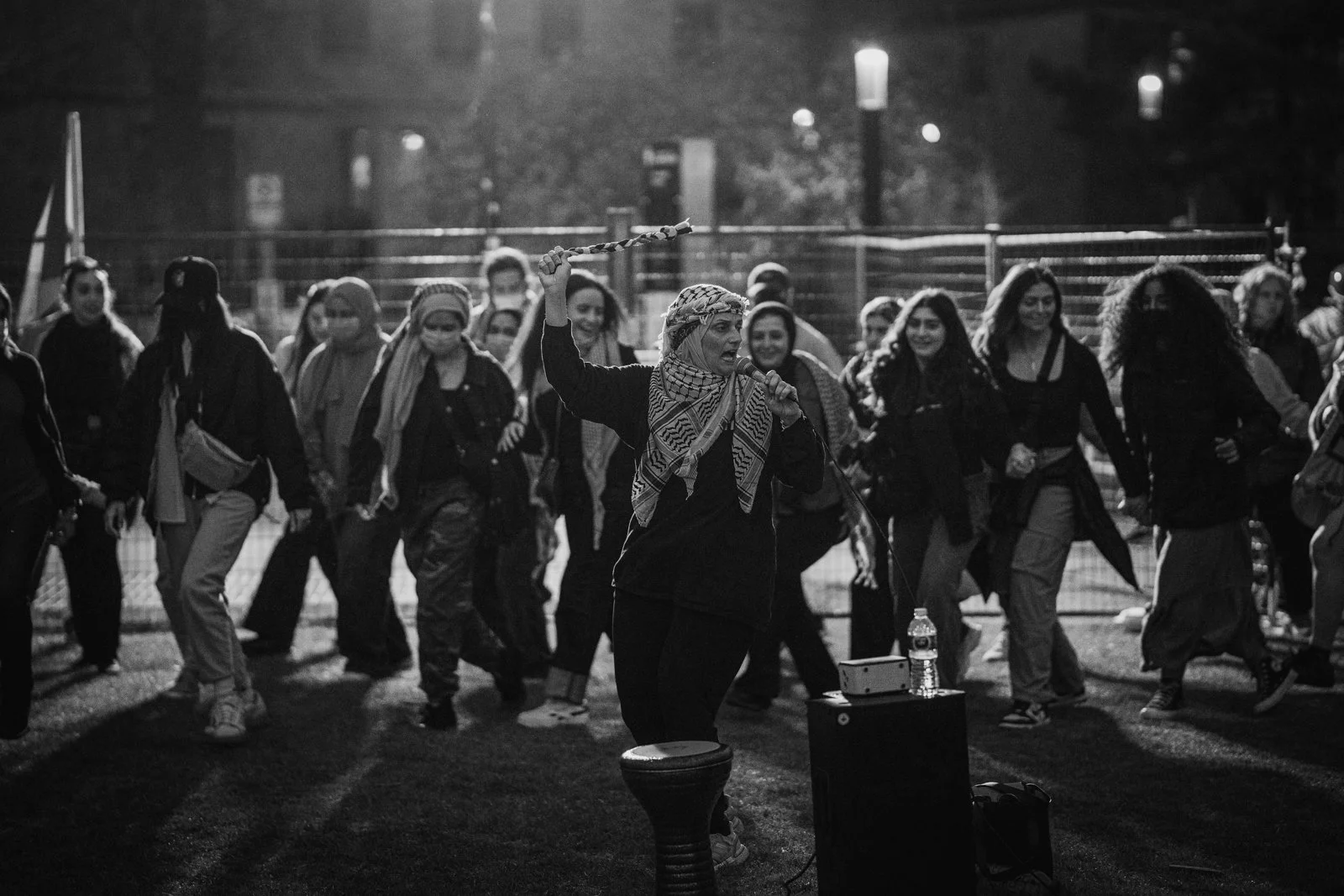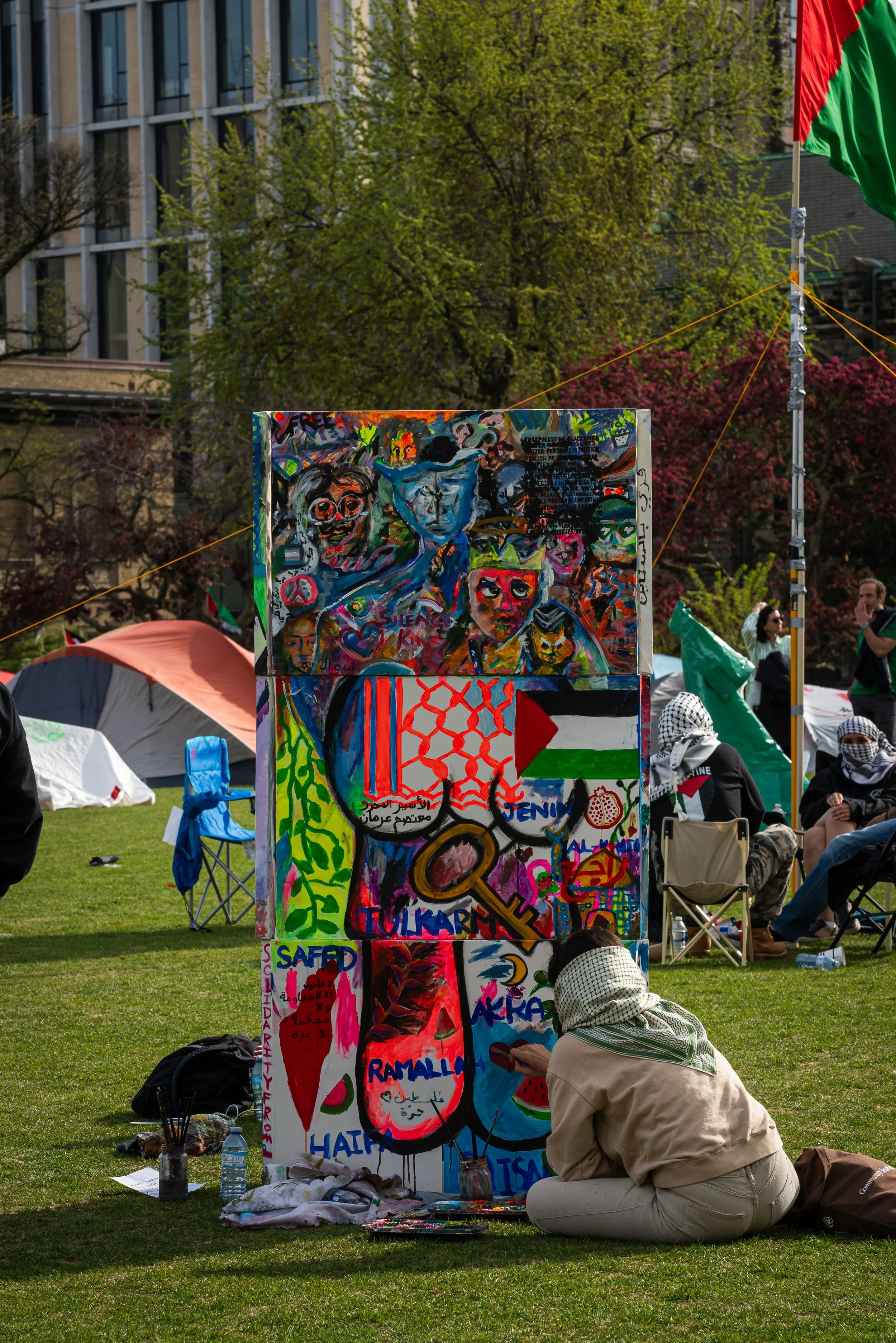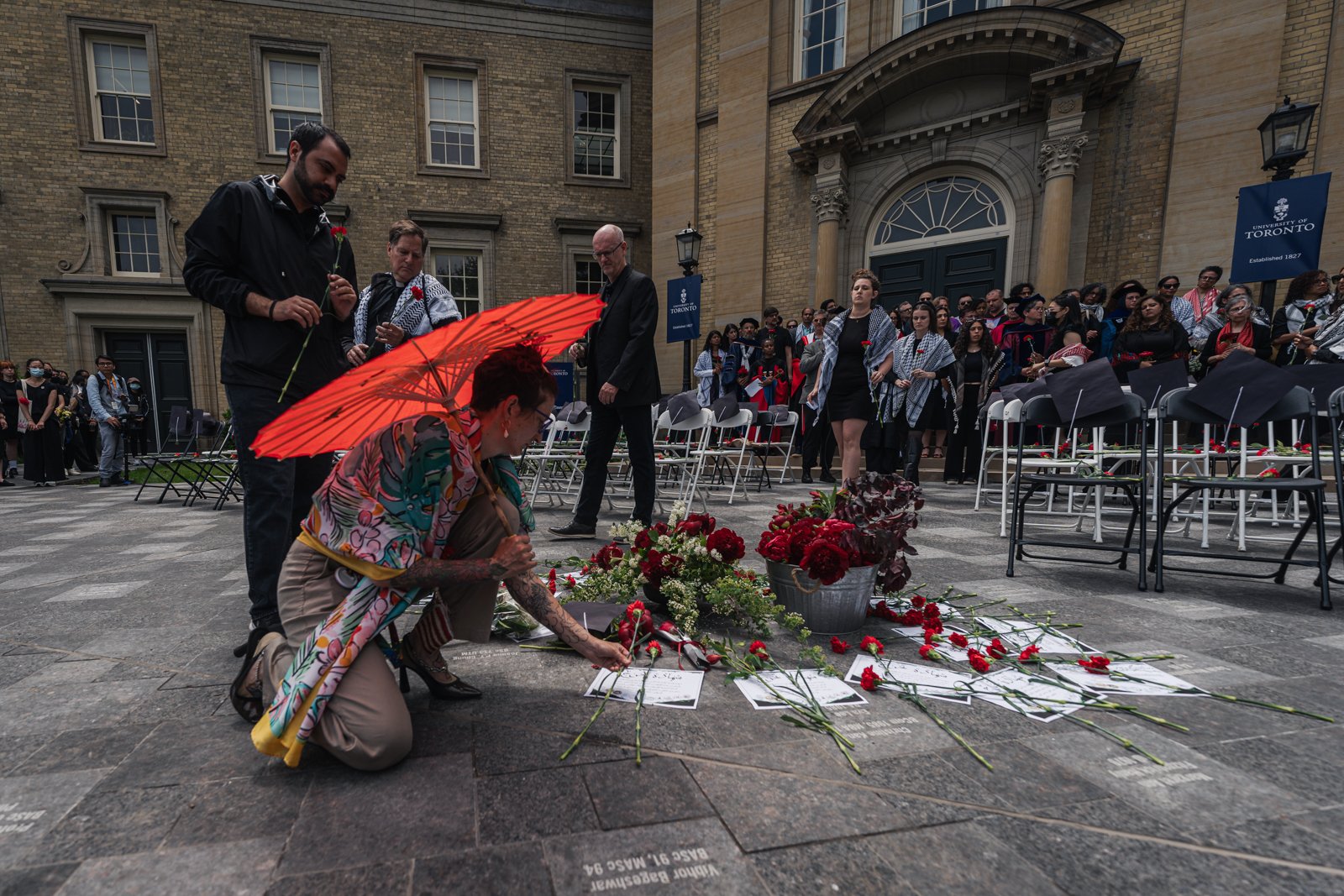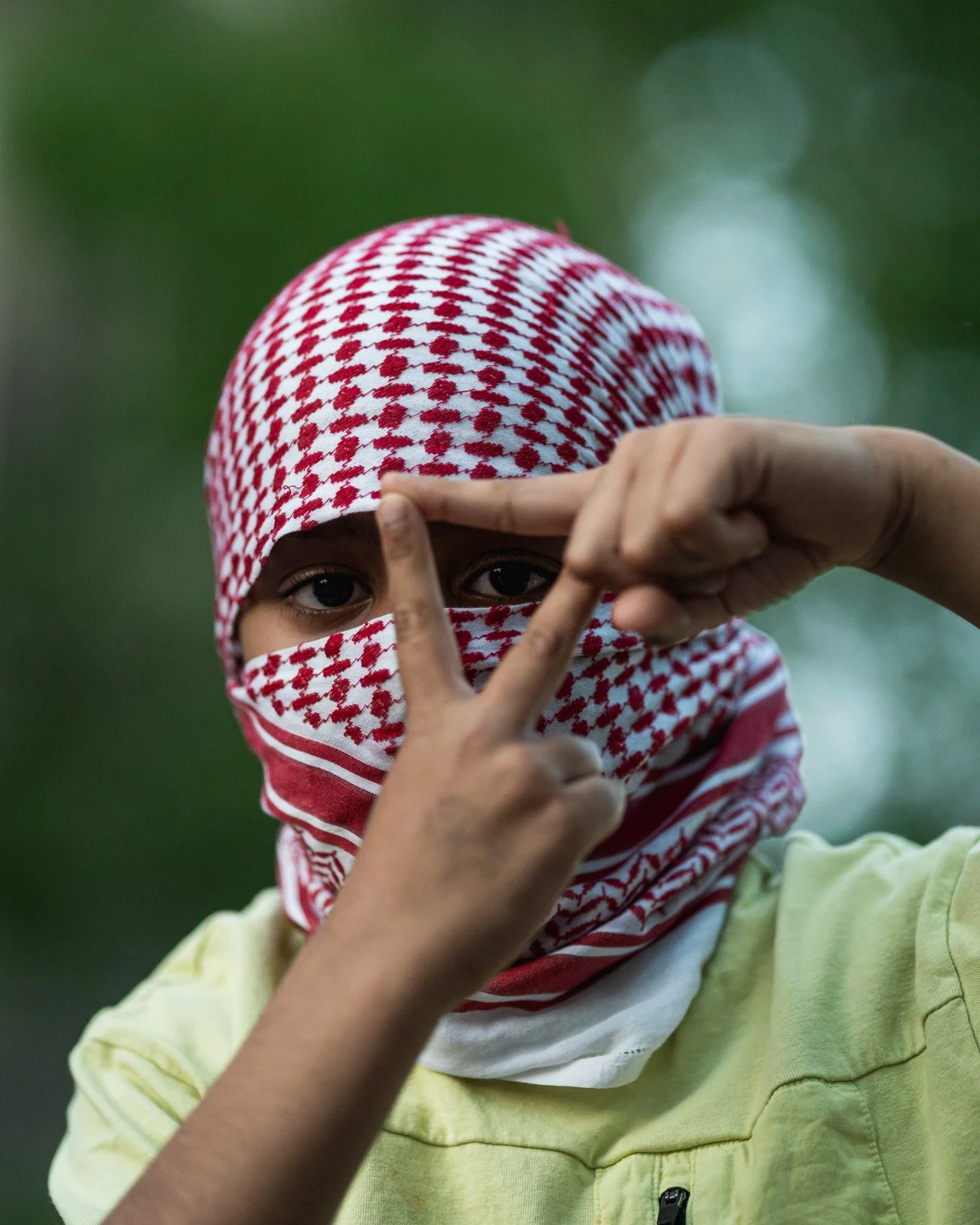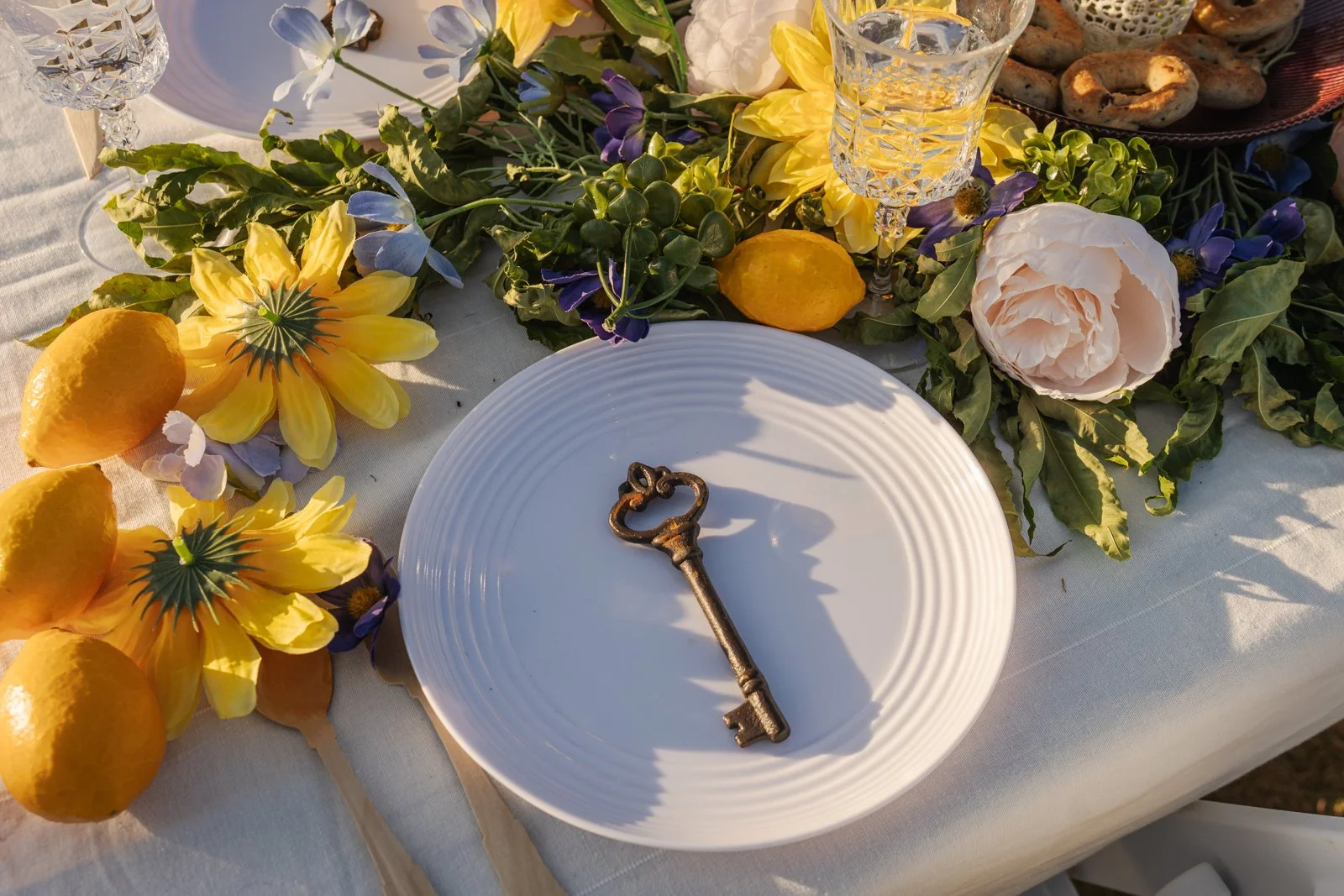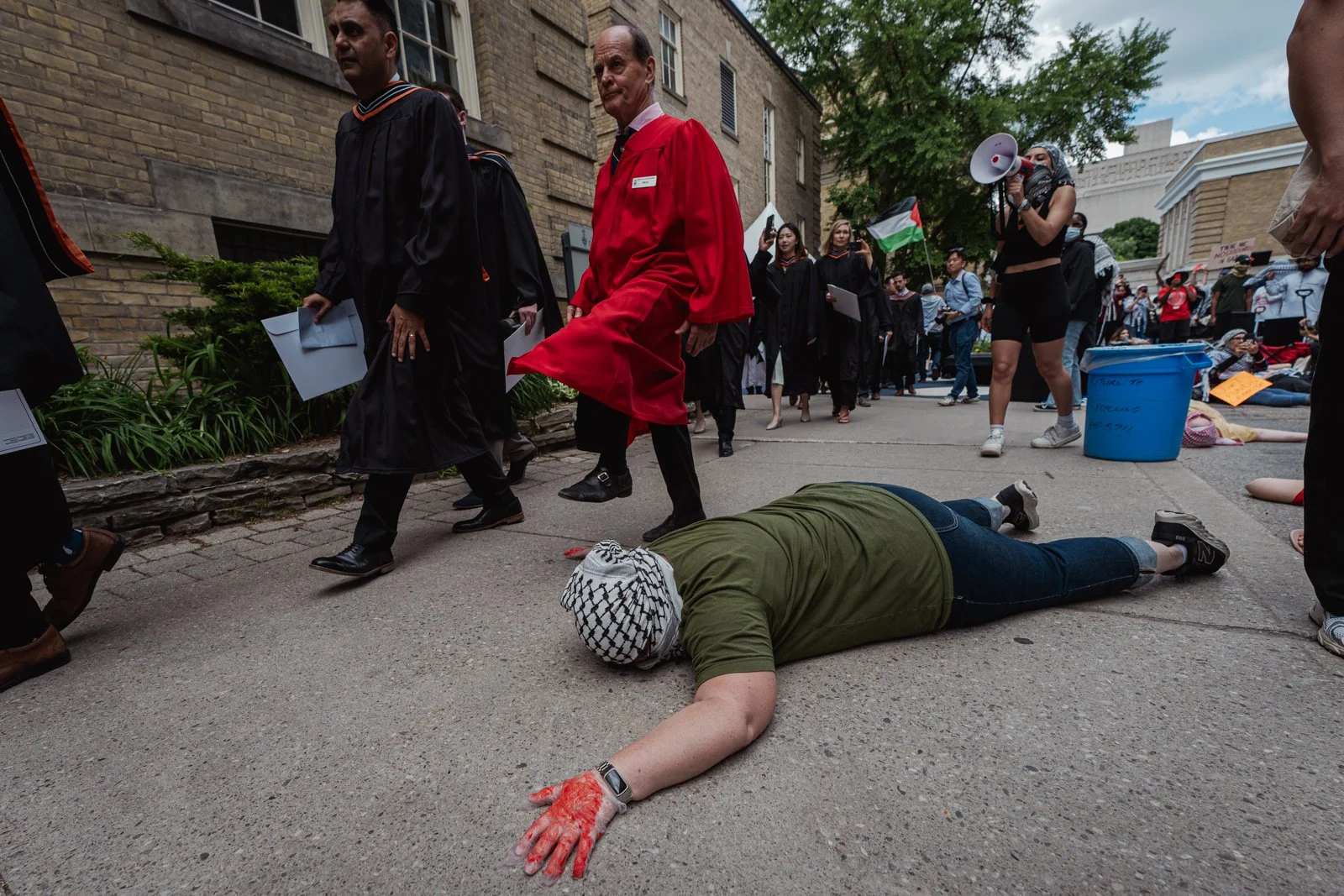‘A space that was never there before’
Five Palestinians reflect on the student camp at the University of Toronto
Desmond Cole
Photos by Joshua Best
Translation by Shams Seif
A fence set up to stop students from demonstrating for Palestine on University of Toronto campus facilitated their arrival and stay for nine weeks. As students across North America were rallying on campuses for an end to Israel’s siege of the Gaza Strip, U of T leadership approved a fence to enclose King’s College Circle, a central green space on the main campus. In the wee hours of May 2nd, students breached the fence, and used it as a barrier to hold the circle, which they dubbed the People’s Circle for Palestine, for 63 days.
Thousands visited the camp, donated cash and supplies, and amplified the students’ major demands: that U of T fully disclose its financial investments, divest from weapons manufacturers and Israeli companies, and cut ties with Israeli academic institutions, particularly those in occupied Palestinian territories. The school initially rejected these demands outright and told students to leave. U of T administrators claimed the demonstrators were spreading hatred and making campus unsafe, particularly for Jewish students and faculty, and they began negotiating with students to end the action.
The students and admin couldn’t reach a deal, and a court ultimately granted U of T an injunction forcing students to leave. The judge’s decision affirmed the school’s right to use its private property as it wished, and also deemed that students hadn’t engaged in any hateful or violent conduct.
Yes Everything! conducted interviews with five Palestinians—a student, a professor, a refugee, an alumnus, and a journalist in Gaza—who reflected on the camp’s significance. All the interviews have been edited for length and clarity.
Fadwa El-Hussini, a Palestinian U of T student
On Palestinian identity inside the camp:
“My family was displaced during the Nakba in 1948 from Jerusalem into Egypt. That's four generations. So slowly, being Palestinian in a society feels like more of a symbol because we're not in the same place all the time. The Palestinian identity is being hidden, it's being silenced. In Canada, in Egypt, in Lebanon, they don't want you to be Palestinian. So growing up, it was me and my family that are Palestinian, but I've never had the Palestinian culture around me.
So when I walked into this place, it was kind of like, ‘it's okay to be Palestinian. If anything, we appreciate you as a Palestinian,’ which is something that isn't experienced in my daily life. When outside of this camp, you tell someone you're Palestinian, you either get, ‘Oh, I'm so sorry,’ or ‘where's that? You mean, Israel?’
I think being surrounded by so many Palestinians, and so many Arabs, and so many people who want to learn more about Palestine, want that culture to flourish, it has made me feel safe. It has given me a space that was never there before. This camp is allowing what the university wants to hide, what these institutions want to hide, which is our existence as Palestinian. Instead of silencing us, this camp just puts us in front of them, which is a pressure point, because they're seen for what they're trying to do.
This camp is just a mechanism to bring forth biases that these institutions have towards us. It's not pure resistance, because I'd never compare that to actual resistance within Palestine, or within any oppressed peoples, but it's still the beginning of a form of resistance, and we're not going anywhere as Palestinians.”
On what the camp has achieved:
“I think this camp has actually put pressure on institutions to recognize that as Palestinians we exist, that they cannot just walk over us, that our people mean something. There's this implicit racism that is very evident that Palestinians are just to be thrown away, discarded. They matter so much as we can use them, to say we have a diversity of people in here. But then you go in and you kill my people. You're okay with genocide, you push for that.
We're like a thorn in their hand. So it's if anything it has given us visibility, and it has given us community. It shows us who's there for us and who's not there. We've grown to have so many relationships with unions, with professors, with different like coalitions of people. We've achieved the support network that wasn't there before, that wasn't solidified. So even the university isn't giving us exactly what we want right now, hopefully not for long, hopefully they will.”
On attempts to characterize the camp as hateful and violent:
“I think it's very well understood why this happens. You can see it as the colonialism which this institution is based on. When the institution says that ‘this is my private property, you're trespassing,’ it's not. This is colonized land, and [administrators] have stated that, but their implicit racism allows them to continue saying this is private property. This is native land and they recognize that in the land acknowledgements they do. But then they come tell Palestinians, with First Nations people here, that we're trespassing.
I don't think there's any logic to it, but there are implicit biases, there's an Orientalism like an Occident/Orient nature to it. They have painted us in a picture that's barbaric, that we're like hooligans, because this is the narrative they grew up to protect themselves with. This is the white supremacist nature of ‘we are better than you. You guys are still evolving to be like us. You don't understand private property, you don't understand what it means to be a land owner.’
I don't think too much of it. If anything, it's it makes me want to study more.“
Issa, a Palestinian refugee who lives in Toronto and recently became a permanent resident.
On the decision to visit the camp:
“I just follow my heart. I felt like belonging to this movement, I feel belonging to the students, I need their energy, I need the hope. As a Palestinian living in Toronto, there's a lot of depression, feeling down because of the news, worrying a lot about family back home. You need the community to survive and just manage your mental health and your needs.
And also feel belonging, because when you leave everything behind you back home, and you just emigrated and start refugee process, and it takes so long to get the permanent residence, and you have nobody here and with the intense situation back home, you need family. So I believe my heart guided me to this family and I feel belonging, I feel welcoming. And I feel comfort with being around those people who are trying, like they're chanting with Palestine, it's very powerful and emotional to me.”
On the risks taken by student demonstrators:
“They know what they are doing, and they are willing to pay for other people’s freedom because nobody is free unless everybody is free. They are fully aware and enlightened to what's going on. There's a lot of propaganda in the mainstream media, a lot of biased coverage. Most of the society here and the people in Canada are against Palestinians because they don't know what's going on. They demonize the Palestinian identity, they demonize anything related to Palestine, and they victimize and always play the victim card for Zionists and Israelis.
So it's very complicated, but people who came, they know what they are doing, they are willing to pay. And it's not only for Palestine, it's for any other cause. The same oppressive system that is hurting Palestine, it's hurting Canadians here in their homes. The same company who will increase prices and do inflation, they are investing money in military equipment, and they invest in that war. So that profiting in people's pain, it's the same pain. So we feel each other.
I really am grateful, and no words can express my gratitude for what they are doing. I know it's too much for people, many people lost their jobs, their friends, lost even their family for their political opinion on Palestine. And they know the right and wrong, and they’ve done it, even even though they lost those loved people, they know that it’s worth it.”
On the critique that such demonstrations are a distraction from Gaza and Palestine:
“I understand that point of view, and it's not [the student’s] fault. This is a problem with the mainstream media, who are biased with their coverage. And they are trying just to put the fault on students for something they didn't do. Since the war, they just cover the Israeli part, they don't cover the Palestinian part. There is a lot of press media, doctors, nurses, a lot of people get murdered in cold blood. There are a lot of reports of mass graves.
Politicians don't condemn killing innocent people. They don't consider Palestinians as people, as humans. So it's hurting and it's very heavy, People are filled with anger and frustration from the mainstream media and from their politicians and representatives, and from the companies. So these people see Palestinians as human beings, as part of their community. We are people who love peace, we don't love war. But unfortunately, we are a victim of genocide. Meanwhile, the mainstream media portrays us as savages and terrorists.”
On solidarity with Indigenous people:
“I hope that the indigenous people will be empowered one day to rule the country. I used to live under occupation, where the settlers oppressed me. I would love to have the Indigenous blessing before getting my citizenship, to allow me to have to live among them and their land because it's their land. It's hurting me to be a settler here, but I have no option.
I was stateless, I was without any rights, and it took me so long to proceed with my papers to get my permanent residence. So I feel the oppression even here in Canada. I'm not feeling comfortable to say out loud that I'm Palestinian. When people try to ask me, I try to avoid the answer because I'm not feeling safe. Not because of people, because of the media, because of the government and the system.
My ancestors lived in Palestine for more than 2,000 years. My family is one of the first Christian families on the whole earth. People who come to lecture us about Christianity, my family found that religion, my family has saints, my family served the church before people knew what Christianity is or who Jesus is. So one of the things I would love to address the churches here who are silent.”
Osama Aldahdouh, a Palestinian journalist currently reporting in Gaza. He spoke to us from a camp outside Shuhada’a al Aqsa hospital,one of Gaza’s few functioning hospitals, in Deir al-Balah. His words are translated from Arabic by Shams Seif.
On the impact of seeing images and videos from the U of T camp, and on Israel’s occupation of Gaza
“[The camp] means there is an alive conscience. It means there is something of humanity in this world that watches, observes, and follows in silence all this genocidal war, that has targeted and destroyed hundreds of thousands of civilians, of children, of women, killed families entirely, erased them completely from the civil registry, not a single one of them remaining. And in front of the eyes and ears of the world, the oppressive silent world and with direct support from Western governments, especially the United States that still sends cargo planes and trucks and ships to support the Israeli Occupation.
It means to have a Western voice supporting the Palestinian Struggle, it means it is a present and it means that it is possible now for the youth, and this is important. The category of the youth to now play its role in bringing about a change, and creating a change to speak a loud and clear voice, “Enough! Enough to Israel the murderer, enough to their killing of civilians! Enough of it being above.
We are not asking for much, all we ask for is for Israel to be confined to all the international charters and laws that the global community has placed, that all the states are forced to be confined to, relating to the children’s rights, women’s rights, civilians’ rights, the rules and limits of war, the use of live bullets, the use of bombs. Even if it wages war, and even if it kills some Palestinians, but to at the very least stick to global conventions. So the Palestinians can get their right to self-determination.
For the Palestinians to live if for one day without strikes, without fighter jets, without tanks, without shelling, without a siege! The Gaza Strip, this war is not new, the Gaza Strip has been under a siege from 18 years, 18 continuous years, and it is hungry and unclothed, with no economy, no education like the rest of the world, no flourishing economy, no life! The people in Gaza,want to live in peace and safety and be able to have relations/connections with the world and have hope for a better future.
From the year 1948 and to this very moment, the Palestinian is forbidden to complain, to cry, to talk/speak/converse, and the Israeli Occupation refuses – as the occupying power – to listen to the suffering of the Palestinian people, and no one has been able, until this moment, to force the occupation to listen/submit to international law.
It challenges everything, it challenges the global community, it challenges global organizations, even the International Court of Justice, that ordered provisional measures to stop the war, stop all military operations in Rafah, and to bring in food, bring in humanitarian aid, all of that the occupation entirely ignored, and bypassed it and did what it did until now.. but rather the severity and barbarity of the killing increased, by the Israeli Occupation after these provisions were ordered.
So, who? Who can stop these crimes? Except this movement, that you started, these camps, these student movements and popular risings/marches, now they help in a big way to ease things, to deliver the message, to clarify what is happening, the world does not see it, because western mainstream media works for the occupation, does deliver the news clearly, does not properly deliver the scenes on the ground,
As such, you changed the scene entirely, us on the ground here, as journalists specifically we got a boost of motivation, we have a thing of hope that we can change what is happening, change the reality, and that we will continue doing all we can to deliver the truth, and the people here also got a boost of patience as a result of what you are doing in these camps.
That it is important, extremely important, that these continue, and this is a message from me and from all of the people of Gaza, that they continue these camps and student movements and university actions, especially in university campuses, to isolate Israel, to make it a pariah state, to sanction Israel, to forbid it from committing more crimes.
If it is now in Gaza, yesterday it was in west bank and before in Jerusalem and tomorrow in Lebanon and other countries, because Israel is a murderous entity—no more.”
To make a donation to Osama Aldahdouh and his family: https://www.gofundme.com/f/help-osama-building-his-familys-life
NOTE: Donations are in Danish Knoner (DKK). At time of publication, 1 Canadian dollar = 5 DKK)
Esmat Elhalaby, a professor in the department of historical and cultural studies at U of T Scarborough Campus
On Palestinian liberation as a generational struggle:
“I remember when we were students, we would, we would go to all the different clubs on campus, and just do Palestine 101 lectures, to the Filipino students association, to the Black Students Association, to MEChA [Chicano Student Movement of Aztlán], to all these groups on campus. And now, 15 years later, you have essentially a whole generation that's down with Palestine.
I went to UCLA, where you saw brutal, brutal repression of a highly organized, well supported encampment. When I was at UCLA, we couldn't have pulled something like that off. We just didn't have the campus support, it was still very divided. But now, I think this is a generational shift. That's profound, and that's going to take us a long way in the next decade.
I think we have broad support, and that's because of the activities of Palestinians on the ground, because of the resilience of the resistance of the people in Gaza, and the West Bank and inside Israel. That will be the beginning and end, that land, but it's also because of generations of organizing at every level.”
On the critique that divesting from Israel does not meaningfully change life in Palestine:
“The call for boycott, divestment, and sanctions is a call that emerged from Palestinians in Palestine. Hundreds of civil society organizations have called for BDS. They're saying ‘we're on the ground, we're seeing this. And we're going to tell the world these are tactics to take on.’ Sometimes we'll say ‘BDS movement,’ that's the wrong way to think about it. BDS is one tactic in the repertoire of tactics for liberation of Palestinians, for a free Palestine, for human rights for everyone between the river and the sea.
Divestment itself is important. The idea that it's impossible to do it is a scandal in itself. The fact that our universities are now so bloated administratively and so wealthy—because of enormous speculation in the market, and exorbitant tuition costs—and they're unable to fucking follow their own money: that's a scandal, right? So if that's their justification, the university has moved a long way from its purported mission
Now, divesting from one corporation or one unit, that might not have any immediate effect. But it's certainly going to have profound symbolic effect. And the accumulation of that symbolic effect does have material effect. And Israelis are very conscious of this. I keep close eyes on the Israeli press and activities of Israelis with regard to this question, especially academic boycott, and they're sweating.”
On risk-taking by students at the camp:
“I'm incredibly proud of them. I feel like an old man saying that but we certainly were not as brave and as organized as they were. They are really on message, they have demands, and they are committed to those demands, and are willing to risk their livelihoods. Every day, you have some loser on Twitter say, ‘Oh, don't hire people from that university.’ And they’re like Teflon, that stuff doesn't even affect them at all, because they're super sharp, razor sharp.
They understand the history and humanity of Palestinians and Palestine. So they're not disconnected from that, which is the, you know, the project of the mainstream media, the project of so many politicians is to disconnect Canadians or Americans from the people of Palestine. Here, they're intimately connected, and they're willing to put their lives on the line for that. And I think that's something that's taking place all over the world—the students at U of T are just one part of it,
I'm in touch with people in Palestine. And Al Jazeera, for example, was here for the first week, just doing story after story. And everyone I talked to is so proud of these students. It will have a huge impact, whether this university can get its shit together and meet the demands of the students, or whether they make the grave mistake of brutalizing their own students and forcibly removing the camp so that they can, you know, get their lawn back. Whatever decision they end up making, the the students have already accomplished a great deal. Being at the camp, seeing how they interact with each other, seeing the world that they’re building, fills me with pride.”
Dania Majid, a U of T Alumni, member of the Arab Canadian Lawyers Association, and a steering committee member of the Hearing Palestine initiative at U of T.
On the camp sustaining itself for two months:
“What they have accomplished is extraordinary, especially under the pressure we know they're under, the smears, the attacks. It's been relentless, but I'm so impressed by how principled they are, how organized they are, how inclusive they are. They have thought about everyone's well being, you know, even the campus well being, making sure that this space reflects the spirit of Palestine, and the spirit of other movements.”
On the school administration’s attempts to characterize students as violent and hateful:
“It's typical U of T, who have never respected Palestinian spirit, this experience of the Palestinian students and faculty on campus. And we saw that play out with Dr. [Valentina] Azzarova as a robust scandal at the University of Toronto. Faculty de-hired Azarova because of her scholarship on Palestine/Israel, when there was no controversy around her scholarship up to that point until we had pro-Israel lobby groups intervene.
And since that, the university’s reputation has been damaged globally. But there's been no attempt to address their anti-Palestinian racism. The medical faculty has also had serious issues around anti-Palestinian racism. And when their faculty, students, residents, educators have tried to raise this with with the faculty, they ended up becoming the subject of a smear campaign by other medical faculty there. To this day, any attempt to talk about anti Palestinian racism with that faculty has failed.
Those are just two examples. But there's there have been other examples, whether it be with Hearing Palestine and other faculty members trying to have these conversations with the university around anti-Palestinian racism. And the university has not really engaged in any serious way. So I can't say that I'm surprised that the university tactics and responses around disclosure and divestment have gone this way.
I think the students knew it wasn't going to be an easy push, that the university isn't the one to take the lead on any sort of social justice issue, or being on the right side of history. They need to be pushed in that direction. And the fossil fuel examples that the students have pointed to is one example, apartheid South Africa another. Palestine is the latest, but probably not the last.”
On the student camp as a space of healing and transformation:
“Seeing the encampment unfold, we have heard so much about campus feeling unsafe and unwelcoming. But I will say, for the first time in my entire life, I actually felt welcomed into a space. This space has been not only such a cathartic and healing and inspiring space for those that are part of the community, the students and educators, but I have seen it have such a transformative impact on the Palestinian community at large.
I am constantly getting pictures from my friends who are taking their kids to the encampment, of their parents at the encampment with their grandchildren. People spending holidays, whether they be the Jewish holidays, Muslim holidays, Easter. To see that people want to take that moment of celebration and have and celebrate it in the camp—I have not seen anything like this before.
We were horrified to see what happened at the universities in Alberta, at York University. I can't explain like how traumatic it was to see militarized police in the U.S. tearing down encampments. I found it really like very hard to stomach, in particular, seeing Black allies being beaten by police They had already just gone through police brutality, protesting police violence in the U.S. To see Black allies put themselves in danger again for the Palestinian cause, I found that really very difficult to watch.
How would the Palestinian and racialized, Black, Indigenous communities feel if the police then come marching into the space and tear it down? After two months, that space has become a home of community, it's organized like a community. And it's at risk. We know it wasn't set up to be permanent. But after this much time, there's there's a lot of emotional ties to what this space represents on the bigger picture for us as a community, as allied communities.
There is such a sense of peace, serenity, and, you know, to see all the signs from all the different communities who are there: Kashmiris for Palestine, Queers for Palestine, Jews against genocide. This space has done more for so-called diversity, equity, and inclusion than any university policy. This is an this is the embodiment of it, if we were really serious about DEI.
It's hard to think what could come next week when the decision comes. I hope there is respect coming from the university, that they understand the space is not just a protest. It's not like a street protest, that it's become a community. It has a strong power and pull for the Palestinian community who have gone there often to seek peace and serenity and hope, especially when people are at their greatest moments of despair.”
Find more of Joshua Best’s photography at https://joshuabest.ca/
